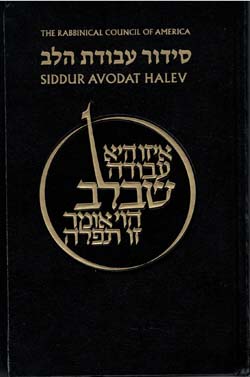Siddur Avodat Halev by Rabbi Basil Herring, Editor-in-Chief, Toby Press, New Milford, CT © 2018, ISBN 978-965-301-936-2, p. 1346, plus an introduction and essay section, $34.95.
By Fred Reiss, Ed.D.

 WINCHESTER, California – Siddur Avodat Halev, the newest prayer book from the Rabbinical Council of America, one of the largest Orthodox Jewish rabbinical associations in the world, follows Nusaḥ Ashkenaz, the prayer-service model used by central and eastern European Jewry. This siddur is a comprehensive weekday, Sabbath, and holiday prayer book in Hebrew with English translations visually aligned to the Hebrew: The first Hebrew word of a paragraph is located in front of its corresponding English paragraph.
WINCHESTER, California – Siddur Avodat Halev, the newest prayer book from the Rabbinical Council of America, one of the largest Orthodox Jewish rabbinical associations in the world, follows Nusaḥ Ashkenaz, the prayer-service model used by central and eastern European Jewry. This siddur is a comprehensive weekday, Sabbath, and holiday prayer book in Hebrew with English translations visually aligned to the Hebrew: The first Hebrew word of a paragraph is located in front of its corresponding English paragraph.
Additionally, the editors print the name of the service and the prayer within that service on each page, enhancing “prayer book geography”. For example, “Shaḥarit for Sabbath & Yom Tov – Shema,” and “Musaf for Festivals – Amida.” There are also special prayer sections, including prayers for Holocaust victims, Yom HaZikaron, Yom HaAtzma’ut, and Yom Yerushalayim. Life-event prayers are given in a section of its own, and there is no need for a separate Chumash for weekday, holiday, rosh hodesh, or fast-day Torah readings, as these are included along with the five megillot.
Prayer book translations frequently convey the English meaning with archaic expressions, or conversely, often fail to accurately communicate the rich Hebrew meaning. The English translation, for instance, of dever, herev, ra’ah veyagon is rendered “epidemics, violence, hunger, and sorrow” in Siddur Avodat Halev, rather than the usual and outdated “enemy, pestilence, sword, famine, and sorrow.” The words “bless” and “You” replace “blest” and “Thou”.
Numerous and detailed annotations describing proper practice and conveying perceptive commentaries appear throughout. One might suspect that an Orthodox Jewish prayer book must marginalize women, but this is not the case in Siddur Avodat Halev, whose goal is to facilitate women’s participation in prayer by incorporating “halakhically-sanctioned prayer practices and textual formulations.” The translations, commentaries, and instructive links are gender sensitive. The word “one” consistently replaces “he,” both the masculine and feminine forms of the Hebrew are used when appropriate, and the multiplicity and importance of women’s Torah studies are cited.
Siddur Avodat Halev, a practical and informative traditional siddur, pulls together fresh rabbinic observations and meaningful translations conveyed in a pleasing font and attractive format. Siddur Avodat Halev is a valuable and useful companion for the home and synagogue.
*
Fred Reiss is a former public and Hebrew school teacher and administrator. His newest works are The Comprehensive Jewish and Civil Calendars: 2001 to 2240; The Jewish Calendar: History and Inner Workings, Second Edition; and Sepher Yetzirah: The Book That Started Kabbalah, Revised Edition. He may be contacted via fred.reiss@sdjewishworld.com.
Pingback: Book Review: Siddur Avodat HaLev | San Diego Jewish World